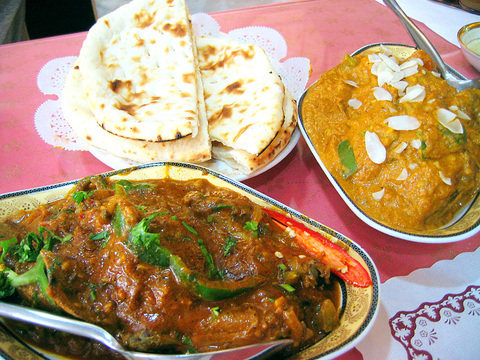Over the past couple of years the number of South Asian eateries in Taipei has climbed to an all-time high. Sadly, however, the increase in numbers doesn't mean that good Indian or Pakistan fare is readily available. Some of the joints might boast "the real thing" in their adverts, but the reality is often different.
All too often, regular butter is substituted for ghee, naan breads are fried instead of baked and plain white rice is served as a sad surrogate for pulao rice. The bottom line is that there are still only three or four South Asian joints worth visiting in Taipei if you have a hankering for genuine Indian-Pakistan fare.
One place that is worth a visit is the recently opened Aaleja. Top Pakistani chef, NA Choudry's eatery may have been open less than two months, but Taipei's newest Indian-Pakistan restaurant has already staked its claim to a top spot in the very short list of good South Asian eateries.

PHOTO: GAVIN PHIPPS, TAIPEI TIMES
Tucked away in an alley adjacent to Yanji Street, Aaleja ("King" in English), serves up a good selection of popular and lesser-known dishes from both Pakistan and India. The interior design is minimalist, with a smattering of Asian themes. Seating is comfortable.
The menu is packed with appetizers, side dishes, mutton, chicken, beef, fish and vegetable curries as well as a good selection of biryani and tandoori platters and, of course, plenty of breads. All the meats served are Halal and while alcoholic beverages are not on the menu patrons are free to bring in their favored tipple.
Price-wise, Aaleja is on a par with Taipei's other three leading South Asian diners. On average it will cost diners between NT$800 and NT$1,000 for a slap-up dinner for two, or about NT$400 for one person. A few recommendations for a sumptuous meal at the Aaleja include aloo tikka (NT$130), mutton bhuna (NT$390), chicken zafrani (NT$450), seekh kabab (NT$290), zeera aloo (NT$210), chana masala (NT$260) and mutton pulao (NT$220). The naan bread is good.
Along with the regular menu the joint also serves up a lunch special in which diners can enjoy a set meal of soup, main course, bread, rice and salad, all for NT$195. It's cheap and there's certainly nothing wrong with the fare, but the special probably won't alleviate the hunger pangs of true curry purists.
In addition to the great chow, service at Aaleja is also worth a mention. When this reviewer hit the joint unannounced earlier this week with a ravenous posse of nine the staff didn't balk.
Orders were promptly taken and we were served an exceptional assortment of dishes. And, more importantly, there wasn't one complaint from any member of our party, which did include a couple of rather outspoken and fastidious diners.

April 14 to April 20 In March 1947, Sising Katadrepan urged the government to drop the “high mountain people” (高山族) designation for Indigenous Taiwanese and refer to them as “Taiwan people” (台灣族). He considered the term derogatory, arguing that it made them sound like animals. The Taiwan Provincial Government agreed to stop using the term, stating that Indigenous Taiwanese suffered all sorts of discrimination and oppression under the Japanese and were forced to live in the mountains as outsiders to society. Now, under the new regime, they would be seen as equals, thus they should be henceforth

Last week, the the National Immigration Agency (NIA) told the legislature that more than 10,000 naturalized Taiwanese citizens from the People’s Republic of China (PRC) risked having their citizenship revoked if they failed to provide proof that they had renounced their Chinese household registration within the next three months. Renunciation is required under the Act Governing Relations Between the People of the Taiwan Area and the Mainland Area (臺灣地區與大陸地區人民關係條例), as amended in 2004, though it was only a legal requirement after 2000. Prior to that, it had been only an administrative requirement since the Nationality Act (國籍法) was established in

Three big changes have transformed the landscape of Taiwan’s local patronage factions: Increasing Democratic Progressive Party (DPP) involvement, rising new factions and the Chinese Nationalist Party’s (KMT) significantly weakened control. GREEN FACTIONS It is said that “south of the Zhuoshui River (濁水溪), there is no blue-green divide,” meaning that from Yunlin County south there is no difference between KMT and DPP politicians. This is not always true, but there is more than a grain of truth to it. Traditionally, DPP factions are viewed as national entities, with their primary function to secure plum positions in the party and government. This is not unusual

The other day, a friend decided to playfully name our individual roles within the group: planner, emotional support, and so on. I was the fault-finder — or, as she put it, “the grumpy teenager” — who points out problems, but doesn’t suggest alternatives. She was only kidding around, but she struck at an insecurity I have: that I’m unacceptably, intolerably negative. My first instinct is to stress-test ideas for potential flaws. This critical tendency serves me well professionally, and feels true to who I am. If I don’t enjoy a film, for example, I don’t swallow my opinion. But I sometimes worry